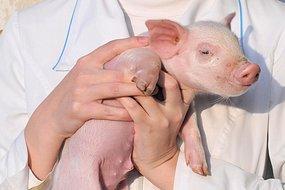An animal organ living inside a human body. No, this is not some Frankenstein spin-off; this is the future of medicine — sort of.
According to BBC, it is more likely that animal tissues and cells will be used instead of entire animal organs.
The biological term for using nonhuman animal cells, tissues or organs in human bodies is xenotransplantation. This is not new research, but until recently the use of stem cells and mechanical organ replacements caused animal organs to fall out of the media’s limelight.
As BBC reports, stem cells cannot currently be used to grow more complex organs, and mechanical organs are only used as a temporary replacement. So, xenotransplantation may soon be leaving the research lab and become a reality in the surgical room.
“It is fascinating that we have the ability to do this (xenotransplantation),” Vance Ricks, associate professor of philosophy said.
It may come as a surprise that the animals chosen for transplants are not primates, but pigs. Pigs come in larger numbers than primates, are cheap to raise, are not an endangered species, and the organs of pigs are a similar size to the organs of adult humans. Lastly, while there is still risk of infection with using pigs’ organs, researchers believe this risk is lower than using primates’ organs.
“Xenogeneic infection is a transmissible disease introduced from animals into humans through xenotransplantation,” said Stanford University’s website.
Because primates’ DNA is close to that of humans’ DNA there is a higher risk of xenogeneic infection, according to BBC. Yet, the immune system of the human body still attacks the transplanted cells, tissues, and organs that come from pigs.
To solve this problem there are genetically modified pigs called “GTKO pigs,” and these pigs do not produce a specific pig protein. Researchers, however, say that this protein is not the only aspect that leads to transplant rejection, and that there are other rejection issues that need to be addressed, BBC reports.
Besides the problems of introducing new diseases to the human population and organ rejection, there are the ethical concerns of using animals solely for transplant use. And like many other areas of medical research, xenotransplantation research has used animals to test the safety and effectiveness of transplantation.
“The use of animals for xenotransplantation is unethical. It’s a financial dilemma, and it is a public health catastrophe,” said Alan Berger, executive director of the animal protection institute and a member of the U.S. secretary’s advisory committee on xenotransplantation in an interview with Frontline. “We’re going to be using animals for spare parts for humans.”
Michele Malotky, assistant professor of biology, said that contrary to what many people believe, animal lives will not always be sacrificed.
“It is more likely that tissues will be removed from the animals, which will not kill them,” Malotky said.
Another concern is how researchers will effectively and thoroughly test the safety of xenotransplantation, said Ricks. And how will scientists assess the risks of the transplants?
“More importantly, how are scientists going to address consequences that don’t initially show up?” said Ricks.
The transplantation field is researching different avenues to solve the shortage of transplantable organs that the world faces. Xenotransplantation is one of these avenues, but it is not the only one and it is likely not to be a permanent solution.

